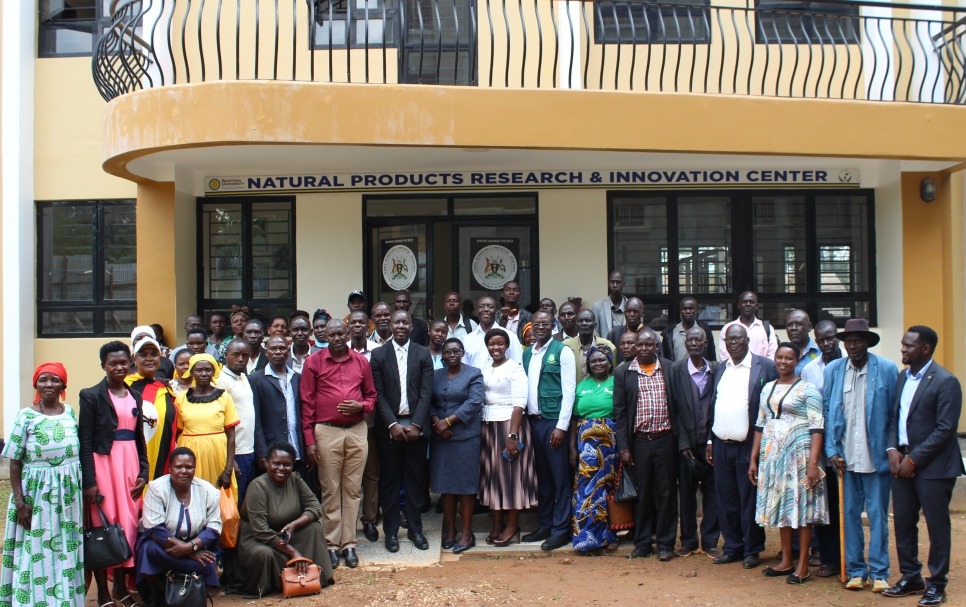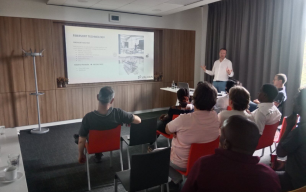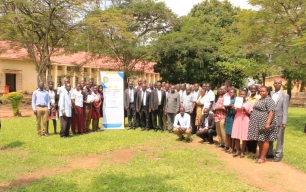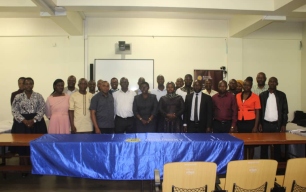Herbal Medicine Exhibition: A New Dawn for Healthcare in Eastern Uganda

On June 25, 2025, Busitema University, in collaboration with the Pathogen Economy Bureau (PEB) of the Secretariat of Science, Technology and Innovation – Office of the President (STI-OP), proudly hosted the inaugural Herbal Medicine Exhibition for Eastern Uganda. The engagement was aimed at bringing together traditional healers, researchers, and policymakers to bridge the gap between the indigenous knowledge holders and scientists so as to create a good working environment where there is mutual benefit, transparency, interdependence and shared vision of enhancing the value of herbal medicine. The exhibition served as a vital platform for dialogue, demonstration, and the exchange of groundbreaking ideas in herbal medicine. The central vision of the exhibition focused on the seamless integration of traditional healing practices with contemporary scientific methods.
According to Dr. Samuel Baker Obakiro, The Centre Leader of the Natural Products Research and Innovation Centre (NaPRiC), some countries like Ghana, China and South Korea have already integrated herbal medicine into their conventional health care systems because they have embraced quality science to advance their herbal medicines. This synergy promises a more holistic and culturally sensitive approach to healthcare, particularly benefiting communities across Eastern Uganda. The goal of NaPRiC is to provide the required scientific evidence to support the standardization of herbal medicine in Uganda for enhanced market potential.
"On behalf of Busitema University, it is my profound honour and pleasure to welcome you all to the Herbal Medicine Exhibition – Eastern Uganda, the first of its kind in our region. Today marks a significant milestone in our shared journey towards improving healthcare through indigenous knowledge, scientific advancement, and innovation. "This inspiring message from the Vice Chancellor, delivered by Assoc. Prof. Saphina Biira, Deputy Vice Chancellor for Academic Affairs and Research, resonated deeply with attendees. It reaffirmed the university’s strong commitment to promoting traditional medicine and fostering a collaborative environment for its development. Her remarks set an optimistic tone for the future of healthcare in the region.
The National Drug Authority (NDA) also played a pivotal role in the event. Dr. Michael Mutyaba, Director of Traditional and Contemporary Medicine, delivered a presentation on The Status of the Herbal Medicine Industry in Uganda: Quality, Regulation, and Commercialization. He urged herbalists to collaborate in adding value to traditional medicines.
“NDA wants to ensure three key elements of traditional medicines: quality, safety, and efficacy. We therefore encourage herbalists to undertake the Occupational Herbalists course offered by the Directorate of Industrial Training (DIT) to help achieve this,” remarked Dr. Mutyaba.
The Pathogen Economy Bureau (PEB) is working closely with other government agencies to provide policy guidance, financial support and strategic direction for the advancement of traditional and complementary medicine. Ms. Brenda Nakazibwe, Team Lead at PEB, emphasized their role in managing and harnessing economic opportunities to support the natural therapeutics value chains in addition to vaccines, diagnostics and medical devices. She stressed the importance of quality science and standardization of herbal medicines through preclinical and clinical trials to ensure that Uganda’s herbal medicines meet both the national and international standards. By adding value to our natural medicines we don’t only improve the quality of primary health care services to our people but also unlock a huge economic power for Uganda as well as create million jobs for our youth.
The exhibition featured a vibrant array of stalls and demonstrations. Traditional healers showcased ancient practices such as plant identification and the preparation of herbal concoctions. Meanwhile, modern scientists demonstrated advanced research techniques, including chromatography for isolating active compounds and in-vitro bioactivity testing. Visitors experienced firsthand the power of blending traditional wisdom with scientific rigor.
Beyond the exhibits, a series of workshops and panel discussions fostered engaging dialogue on vital topics such as intellectual property rights for traditional healers, sustainable harvesting practices, and ethical considerations in herbal medicine research. Participants actively contributed ideas to help shape the future of herbal medicine in Uganda.
The exhibition is expected to have a lasting impact on healthcare in Eastern Uganda. By promoting collaboration between traditional and conventional medicine, it aims to improve access to safe, effective, and affordable healthcare solutions, especially for rural communities. Additionally, the event is projected to stimulate local economies through the sustainable cultivation and commercialization of medicinal plants.
The success of this inaugural exhibition sets a strong precedent for future initiatives. Busitema University and its partners plan to institutionalize the event as an annual platform, expanding its reach and influence in the coming years.
Key recommendations moving forward:
● Establish a Research Fund: Create a dedicated fund to support scientific research into traditional herbal remedies.
● Develop Training Programs: Implement training for both traditional healers and conventional medical practitioners to foster interdisciplinary collaboration.
● Formulate Clear Policies: Collaborate with government agencies to establish supportive policies for integrating traditional medicine into the national health system.
● Community Engagement: Maintain active engagement with local communities to ensure the sustainable use of medicinal plants and preserve indigenous knowledge.
● Protect the environment: Conserve the environment and promote sustainable practices for utilization of medicinal natural resources to avoid extinction particularly for the endangered species
This exhibition marks the beginning of a transformative journey toward a healthier, more inclusive, and sustainable healthcare future for Eastern Uganda.
- 95 views




